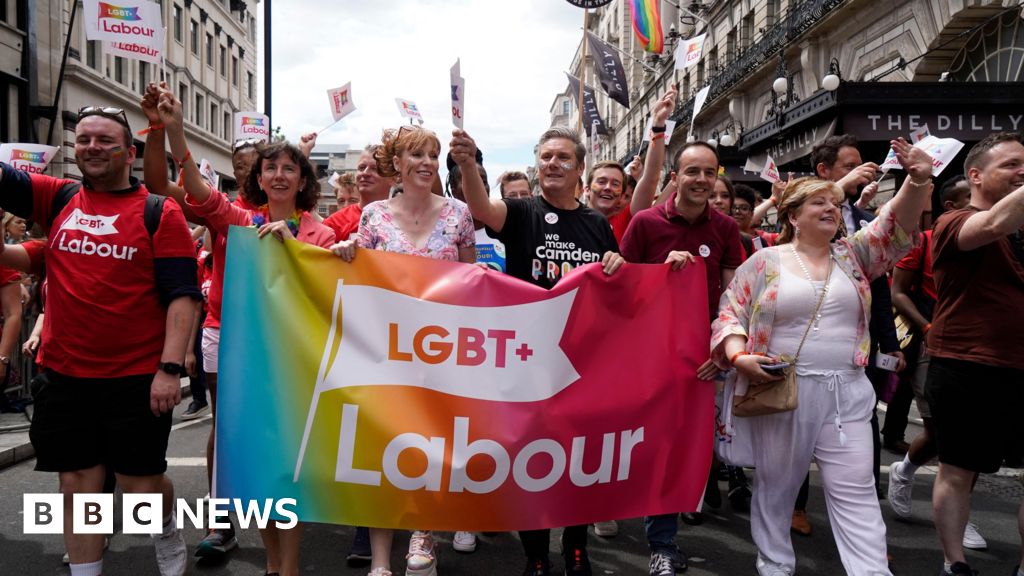Four of the UK’s largest Pride organisations have suspended political parties’ involvement in their events in “unequivocal solidarity” with the transgender community.
Birmingham, Brighton, London and Manchester Prides announced that political parties would not be welcome at their events in an official capacity until they demonstrated a “tangible commitment to trans rights”.
The announcement comes after the Supreme Court ruled that the term “woman” in the Equality Act was defined by biological sex.
The ruling was welcomed by some campaigners representing lesbian, gay and bisexual people who say it protects single-sex groups, while others shared concerns about the impact on the trans community.
A statement from the group of Pride organisers said there was a “disturbing global trend… where LGBTQ+ rights are being systematically rolled back”.
It said: “The UK must not follow this path of regression. Instead, it must rise as a global leader in human rights and equality.”
It said the Supreme Court ruling “underscores the urgent need for immediate action”.
“In this moment, we choose to stand firmer, louder, and prouder in demanding change that protects and uplifts trans lives,” it said.
It said the move to suspend political party participation was a “refusal to platform those who have not protected our rights”.
The recent Supreme Court ruling clarified existing equality laws, and means that the term “woman” in the Equality Act refers solely to biological women.
The legal dispute began in 2018, when the Scottish Parliament passed a bill designed to ensure gender balance on public sector boards.
For Women Scotland complained that ministers had included transgender people as part of the quotas in that law.
After the ruling they said women could “now feel safe that services and spaces designated for women are for women”.
The ruling was also welcomed by some other gender critical groups including Scottish Lesbians, which describes itself as a grassroots campaigning organisation with around 70 members, made up of “lesbians of all ages across Scotland.”
Directors of the group, which made submissions to the Supreme Court in the case, told the BBC: “The Supreme Court decision, which was a clarification of existing law, protects the rights of lesbians as same-sex attracted women.
“As lesbians we’re very relieved that our rights have been protected, and disappointed that Pride has once again abandoned lesbians.”
Some UK organisations – including in sport and politics – have changed or updated their policies around single-sex teams and spaces such as toilets and changing rooms in response to the ruling.
The Equality and Human Rights Commission (EHRC), which enforces equalities law and provides guidance to policymakers, issued interim guidance for service providers which said access to such spaces must be based on biological sex.
The EHRC said the impact of the ruling was that “if somebody identifies as trans, they do not change sex for the purposes of the [Equality] Act, even if they have a Gender Recognition Certificate (GRC)”.
In this respect, the EHRC says, “a trans woman is a biological man” and “a trans man is a biological woman”.
As part of the judgement, Supreme Court judge Lord Hodge stressed that the law still gave protection against discrimination to transgender people.
The four Pride groups which took the decision to exclude political parties represent some of the most popular Pride groups in the UK, with a combined average attendance of over one million people.
The groups have called for “full and enforceable protections under the Equality Act”, “timely and dignified access to NHS gender-affirming healthcare”, a reform of the gender recognition certificate process and “sustainable funding for trans-led services and support organisations across the UK”.
Birmingham Pride had already announced its own ban on some political parties, as had Belfast and Southampton Pride events.
Political parties are often involved in marches and demonstrations at Pride, often with notable politicians using the opportunity to share their parties’ beliefs around LGBT+ issues.
Sir Keir Starmer, Sir Ed Davey, Carla Denyer and Boris Johnson have all previously publicly attended Pride marches in a political capacity.
A spokesperson for LGBT+ Lib Dems said the group was “sickened to our core” at the ban, and accused Pride organisers of creating a “blanket suspension” which was “lumping them in” with other political parties.
They told the BBC: “We look forward to a constructive dialogue with Pride organisers so we can come back bigger and better.”
